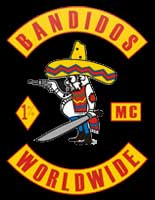
The Bandidos Motorcycle Club, also known as the Bandido Nation, is an outlaw motorcycle club with a worldwide membership. Formed in San Leon, Texas, in 1966, the Bandidos MC is estimated to have between 2,000 and 2,500 members and 303 chapters located in 22 countries, making it the second-largest motorcycle club in the world behind the Hells Angels.
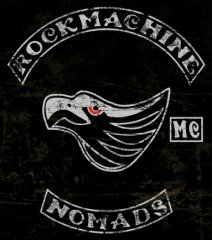
The Rock Machine Motorcycle Club (RMMC) or Rock MachineMC is an International Outlaw Motorcycle Club founded in Montreal, Quebec, Canada in 1986. It has chapters world wide through out Canada, United States, Europe & Australia. It was formed in 1986, by Salvatore Cazzetta and his brother Giovanni Cazzetta. The Rock Machine competed with the Hells Angels for control of the street-level narcotics trade in Quebec. The Quebec Biker War saw the Rock Machine form an alliance with a number of other organizations to face the Hells Angels. The conflict occurred between 1994 and 2002 and resulted in over 160 deaths and over 300 injured. An additional 100+ have been imprisoned.
The Nordic Biker War was a gang war that began in January 1994 and continued until September 1997 in parts of Scandinavia and Finland, involving the Hells Angels and Bandidos outlaw motorcycle clubs. The conflict is also known as the Great Nordic Biker War or Second Biker War to distinguish it from the earlier Copenhagen Biker War, which took place between 1983 and 1985.

Per Michael "Joe" Ljunggren was a Swedish outlaw biker and gangster who served as the first national president of the Bandidos Motorcycle Club in Sweden. Ljunggren was a central figure in the Nordic Biker War, in which the Bandidos feuded with the Hells Angels. He was shot dead while riding his motorcycle on the E4 motorway in Småland. The murder remains unsolved, but police believe members of the Hells Angels to be responsible.

The Brother Speed Motorcycle Club is an American outlaw motorcycle club that was formed in Boise, Idaho in 1969, and is active in Idaho, Washington, and Oregon. It once was referred to by the Oregon Department of Justice as one of the nine "motorcycle clubs" active in their state.
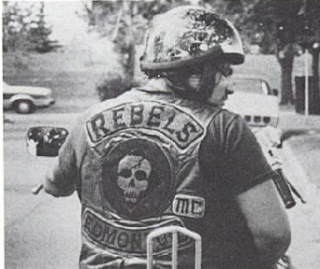
The Rebels Motorcycle Club was an outlaw motorcycle club based in Western Canada that was founded in Red Deer, Alberta in 1968. It was one of the three dominant motorcycle clubs in the province of Alberta during the 1970s-1990s

The Nomads Motorcycle Club is an outlaw motorcycle club in Australia with a large number of chapters and members nationwide. It was founded in Newcastle in 1968. A number of countries have motorcycle clubs called "Nomads Motorcycle Club", e.g. Australia, South Africa and Germany, and there is a Nomads gang in New Zealand.

The Bacchus Motorcycle Club (BMC) is an Outlaw motorcycle club in Canada. Founded during 1972 in Albert County, New Brunswick. Bacchus MC has since increased its influence, opening fifteen chapters in five Canadian provinces. It is currently the third largest Canadian established 1% motorcycle club.
Rudi Heinz Elten, nicknamed "Eschli", was a German outlaw biker, gangster and member of the Bandidos Motorcycle Club. Elten was shot dead in Duisburg on 8 October 2009 by Timur Akbulut, a prospective member of the rival Hells Angels Motorcycle Club.

The Diablos Motorcycle Club is an international outlaw motorcycle club that was founded in Pattaya, Thailand, in 1999. The Diablos are a support club for the Bandidos.

On 10 March 1996, six members of the Hells Angels Motorcycle Club ambushed four rival Bandidos Motorcycle Club members outside Copenhagen Airport, killing one man and wounding three others with gunfire. A twin attack was also carried out at Oslo Airport, Fornebu in Norway within an hour of the Denmark shooting, leaving one man injured. The incident occurred during the Nordic Biker War (1994–97).
On 6 October 1996, a rocket-propelled grenade was fired at the headquarters of the Hells Angels Motorcycle Club in Copenhagen, Denmark, killing two people and injuring nineteen others. A prospective member of the rival Bandidos Motorcycle Club was convicted of perpetrating the attack, which occurred during the Nordic Biker War (1994–97).

The Red Devils Motorcycle Club (RDMC) is an international outlaw motorcycle club and the principal support club of the Hells Angels. The club is not to be confused with the now-defunct Original Red Devils Motorcycle Club that was founded in Canada in the late 1940s.

The Loners Motorcycle Club (LMC) is an international outlaw motorcycle club founded in Woodbridge, Ontario, Canada in 1979. It has seventeen chapters in Canada, eleven chapters in Italy, eleven in the United States. They also possess several chapters in other countries across the world. The club was established by two prominent Italian-Canadian bikers, Frank Lenti and Gennaro Raso.
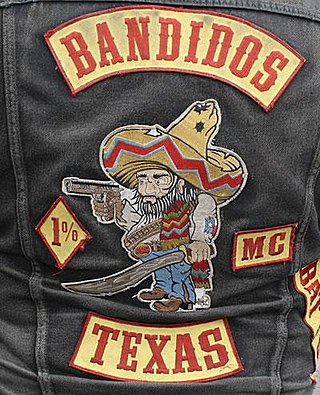
The Bandidos Motorcycle Club is classified as a motorcycle gang by law enforcement and intelligence agencies in numerous countries. While the club has denied being a criminal organization, Bandidos members have been convicted of partaking in criminal enterprises including theft, extortion, prostitution, drug trafficking and murder in various host nations.
The Ontario Biker War in Canada saw the Hells Angels engage their long-term rivals the Outlaws Motorcycle Club for control of the province of Ontario. The war occurred between 1999 and 2002 and is also known as the London Biker conflict as a large majority of the events occurred in the city of London, Ontario. The Quebec Biker War, the largest motorcycle conflict in history was occurring during the same period in the province of Quebec.
The city of London, Ontario, Canada was established in 1826, and has since grown into Canada's 11th largest municipality. The city has had a long history of organized crime, with several high-profile incidents occurring there over the years. In 1901, London's first MP, John Carling, attributed the growth of London to three factors: the establishment of regional courts and administration in 1826, the arrival of the military garrison in 1838, and the arrival of the railway in 1853. From its position along the Quebec City–Windsor Corridor, the city has attracted investment in commerce, culture and manufacturing, and attracted criminal enterprises to exploit that growth.
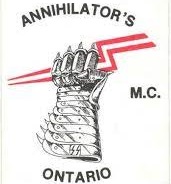
The Annihilators Motorcycle Club was a Canadian outlaw biker club and organized crime group of the 1980s and 1990s.













